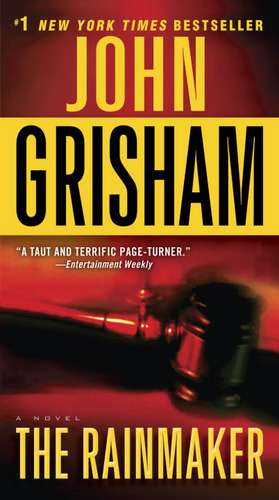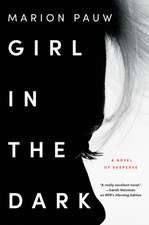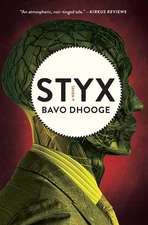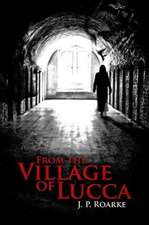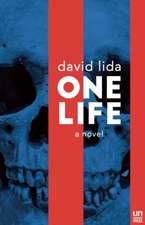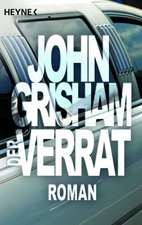The Rainmaker
Autor John Grishamen Limba Engleză Paperback – 30 noi 2011 – vârsta de la 14 până la 18 ani
It’s summer in Memphis. The sweat is sticking to Rudy Baylor’s shirt and creditors are nipping at his heels. Once he had aspirations of breezing through law school and punching his ticket to the good life. Now he doesn’t have a job or a prayer—except for one: an insurance dispute that leaves a family devastated and opens the door for a lawsuit, if Rudy can find a way to file it.
By the time Rudy gets to court, a heavyweight corporate defense team is there to meet him. And suddenly he’s in over his head, plunged into a nightmare of lies and legal maneuverings. A case that started small is exploding into a thunderous million-dollar war of nerves, skill, and outright violence—a fight that could cost one young lawyer his life, or turn him into the biggest rainmaker in the land.
| Toate formatele și edițiile | Preț | Express |
|---|---|---|
| Paperback (3) | 63.86 lei 24-35 zile | +30.02 lei 7-11 zile |
| Random House – 28 oct 2010 | 63.86 lei 24-35 zile | +30.02 lei 7-11 zile |
| Dell Publishing Company – 30 noi 2011 | 67.41 lei 3-5 săpt. | |
| DELTA – 31 aug 2005 | 104.97 lei 3-5 săpt. |
Preț: 67.41 lei
Nou
Puncte Express: 101
Preț estimativ în valută:
12.90€ • 13.33$ • 10.74£
12.90€ • 13.33$ • 10.74£
Carte disponibilă
Livrare economică 04-18 martie
Preluare comenzi: 021 569.72.76
Specificații
ISBN-13: 9780345531933
ISBN-10: 0345531930
Pagini: 598
Dimensiuni: 110 x 190 x 39 mm
Greutate: 0.34 kg
Editura: Dell Publishing Company
ISBN-10: 0345531930
Pagini: 598
Dimensiuni: 110 x 190 x 39 mm
Greutate: 0.34 kg
Editura: Dell Publishing Company
Recenzii
“A taut and terrific page-turner.”—Entertainment Weekly
“Great fun to read . . . The complex plotting is Grisham’s major accomplishment.”—Los Angeles Times
“The pace is fast, the characters quirky, the result entertaining.”—USA Today
“[Grisham is] a mighty narrative talent.”—Chicago Sun-Times
“Great fun to read . . . The complex plotting is Grisham’s major accomplishment.”—Los Angeles Times
“The pace is fast, the characters quirky, the result entertaining.”—USA Today
“[Grisham is] a mighty narrative talent.”—Chicago Sun-Times
Notă biografică
John Grisham is the author of twenty-three novels, including, most recently, The Litigators; one work of nonfiction, a collection of stories, and a novel for young readers. He is the Chairman of the Board of Directors of the Mississippi Innocence Project at the University of Mississippi School of Law. He lives in Virginia and Mississippi.
Extras
CHAPTER ONE
MY DECISION to become a lawyer was irrevocably sealed when I realized my father hated the legal profession. I was a young teenager, clumsy, embarrassed by my awkwardness, frustrated with life, horrified of puberty, about to be shipped off to a military school by my father for insubordination. He was an ex-Marine who believed boys should live by the crack of the whip. I'd developed a quick tongue and an aversion to discipline, and his solution was simply to send me away. It was years before I forgave him.
He was also an industrial engineer who worked seventy hours a week for a company that made, among many other items, ladders. Because by their very nature ladders are dangerous devices, his company became a frequent target of lawsuits. And because he handled design, my father was the favorite choice to speak for the company in depositions and trials. I can't say that I blame him for hating lawyers, but I grew to admire them because they made his life so miserable. He'd spend eight hours haggling with them, then hit the martinis as soon as he walked in the door. No hellos. No hugs. No dinner. Just an hour or so of continuous bitching while he slugged down four martinis then passed out in his battered recliner. One trial lasted three weeks, and when it ended with a large verdict against the company my mother called a doctor and they hid him in a hospital for a month.
The company later went broke, and of course all blame was directed at the lawyers. Not once did I hear any talk that maybe a trace of mismanagement could in any way have contributed to the bankruptcy.
Liquor became his life, and he became depressed. He went years without a steady job, which really ticked me off because I was forced to wait tables and deliver pizza so I could claw my way through college. I think I spoke to him twice during the four years of my undergraduate studies. The day after I learned I had been accepted to law school, I proudly returned home with this great news. Mother told me later he stayed in bed for a week.
Two weeks after my triumphant visit, he was changing a lightbulb in the utility room when (I swear this is true) a ladder collapsed and he fell on his head. He lasted a year in a coma in a nursing home before someone mercifully pulled the plug.
Several days after the funeral, I suggested the possibility of a lawsuit, but Mother was just not up to it. Also, I've always suspected he was partially inebriated when he fell. And he was earning nothing, so under our tort system his life had little economic value.
My mother received a grand total of fifty thousand dollars in life insurance, and remarried badly. He's a simple sort, my stepfather, a retired postal clerk from Toledo, and they spend most of their time square dancing and traveling in a Winnebago. I keep my distance. Mother didn't offer me a dime of the money, said it was all she had to face the future with, and since I'd proven rather adept at living on nothing, she felt I didn't need any of it. I had a bright future earning money; she did not, she reasoned. I'm certain Hank, the new husband, was filling her ear full of financial advice. Our paths will cross again one day, mine and Hank's.
I will finish law school in May, a month from now, then I'll sit for the bar exam in July. I will not graduate with honors, though I'm somewhere in the top half of my class. The only smart thing I've done in three years of law school was to schedule the required and difficult courses early, so I could goof off in this, my last semester. My classes this spring are a joke: Sports Law, Art Law, Selected Readings from the Napoleonic Code and, my favorite, Legal Problems of the Elderly.
It is this last selection that has me sitting here in a rickety chair behind a flimsy folding table in a hot, damp, metal building filled with an odd assortment of seniors, as they like to be called. A hand-painted sign above the only visible door majestically labels the place as the Cypress Gardens Senior Citizens Building, but other than its name the place has not the slightest hint of flowers or greenery. The walls are drab and bare except for an ancient, fading photograph of Ronald Reagan in one corner between two sad little flagstone, the Stars and Stripes, the other, the state flag of Tennessee. The building is small, somber and cheerless, obviously built at the last minute with a few spare dollars of unexpected federal money. I doodle on a legal pad, afraid to look at the crowd inching forward in their folding chairs.
There must be fifty of them out there, an equal mixture of blacks and whites, average age of at least seventy-five, some blind, a dozen or so in wheelchairs, many wearing hearing aids. We were told they meet here each day at noon for a hot meal, a few songs, an occasional visit by a desperate political candidate. After a couple of hours of socializing, they will leave for home and count the hours until they can return here. Our professor said this was the highlight of their day.
We made the painful mistake of arriving in time for lunch. They sat the four of us in one corner along with our leader, Professor Smoot, and examined us closely as we picked at neoprene chicken and icy peas. My Jell-O was yellow, and this was noticed by a bearded old goat with the name Bosco scrawled on his Hello-My-Name-Is tag stuck above his dirty shirt pocket. Bosco mumbled something about yellow Jell-O, and I quickly offered it to him, along with my chicken, but Miss Birdie Birdsong corralled him and pushed him roughly back into his seat. Miss Birdsong is about eighty but very spry for her age, and she acts as mother, dictator and bouncer of this organization. She works the crowd like a veteran ward boss, hugging and patting, schmoozing with other little blue-haired ladies, laughing in a shrill voice and all the while keeping a wary eye on Bosco who undoubtedly is the bad boy of the bunch. She lectured him for admiring my Jell-O, but seconds later placed a full bowl of the yellow putty before his glowing eyes. He ate it with his stubby fingers.
An hour passed. Lunch proceeded as if these starving souls were feasting on seven courses with no hope of another meal. Their wobbly forks and spoons moved back and forth, up and down, in and out, as if laden with precious metals. Time was of absolutely no consequence. They yelled at each other when words stirred them. They dropped food on the floor until I couldn't bear to watch anymore. I even ate my Jell-O. Bosco, still covetous, watched my every move. Miss Birdie fluttered around the room, chirping about this and that.
Professor Smoot, an oafish egghead complete with crooked bow tie, bushy hair and red suspenders, sat with the stuffed satisfaction of a man who'd just finished a fine meal, and lovingly admired the scene before us. He's a kindly soul, in his early fifties, but with mannerisms much like Bosco and his friends, and for twenty years he's taught the kindly courses no one else wants to teach and few students want to take. Children's Rights, Law of the Disabled, Seminar on Domestic Violence, Problems of the Mentally Ill and, of course, Geezer Law, as this one is called outside his presence. He once scheduled a course to be called Rights of the Unborn Fetus, but it attracted a storm of controversy so Professor Smoot took a quick sabbatical.
He explained to us on the first day of class that the purpose of the course was to expose us to real people with real legal problems. It's his opinion that all students enter law school with a certain amount of idealism and desire to serve the public, but after three years of brutal competition we care for nothing but the right job with the right firm where we can make partner in seven years and earn big bucks. He's right about this.
The class is not a required one, and we started with eleven students. After a month of Smoot's boring lectures and constant exhortations to forsake money and work for free, we'd been whittled down to four. It's a worthless course, counts for only two hours, requires almost no work, and this is what attracted me to it. But, if there were more than a month left, I seriously doubt I could tough it out. At this point, I hate law school. And I have grave concerns about the practice of law.
This is my first confrontation with actual clients, and I'm terrified. Though the prospects sitting out there are aged and infirm, they are staring at me as if I possess great wisdom. I am, after all, almost a lawyer, and I wear a dark suit, and I have this legal pad in front of me on which I'm drawing squares and circles, and my face is fixed in an intelligent frown, so I must be capable of helping them. Seated next to me at our folding table is Booker Kane, a black guy who's my best friend in law school. He's as scared as I am. Before us on folded index cards are our written names in black felt--Booker Kane and Rudy Baylor. That's me. Next to Booker is the podium behind which Miss Birdie is screeching, and on the other side is another table with matching index cards proclaiming the presence of F. Franklin Donaldson the Fourth, a pompous ass who for three years now has been sticking initials and numerals before and after his name. Next to him is a real bitch, N. Elizabeth Erickson, quite a gal, who wears pinstripe suits, silk ties and an enormous chip on her shoulder. Many of us suspect she also wears a jockstrap.
Smoot is standing against the wall behind us. Miss Birdie is doing the announcements, hospital reports and obituaries. She's yelling into a microphone with a sound system that's working remarkably well. Four large speakers hang in the corners of the room, and her piercing voice booms around and crashes in from all directions. Hearing aids are slapped and taken out. For the moment, no one is asleep. Today there are three obituaries, and when Miss Birdie finally finishes I see a few tears in the audience. God, please don't let this happen to me. Please give me fifty more years of work and fun, then an instant death while I'm sleeping.To our left against a wall, the pianist comes to life and smacks sheets of music on the wooden grill in front of her. Miss Birdie fancies herself as some kind of political analyst, and just as she starts railing against a proposed increase in the sales tax, the pianist attacks the keys. "America the Beautiful," I think. With pure relish, she storms through a clanging rendition of the opening refrain, and the geezers grab their hymnals and wait for the first verse. Miss Birdie does not miss a beat. Now she's the choir director. She raises her hands, then claps them to get attention, then starts flopping them all over the place with the opening note of verse one. Those who are able slowly get to their feet.
The howling fades dramatically with the second verse. The words are not as familiar and most of these poor souls can't see past their noses, so the hymnals are useless. Bosco's mouth is suddenly closed but he's humming loudly at the ceiling.
The piano stops abruptly as the sheets fall from the grill and scatter onto the floor. End of song. They stare at the pianist who, bless her heart, is snatching at the air and fumbling around her feet where the music has gathered.
"Thank you!" Miss Birdie yells into the microphone as they suddenly fall back into their seats. "Thank you. Music is a wonderful thang. Let's give thanks to God for beautiful music."
"Amen!" Bosco roars.
"Amen," another relic repeats with a nod from the back row.
"Thank you," Miss Birdie says. She turns and smiles at Booker and me. We both lean forward on our elbows and once again look at the crowd. "Now," she says dramatically, "for the program today, we are so pleased to have Professor Smoot here again with some of his very bright and handsome students." She flops her baggy hands at us and smiles with her gray and yellow teeth at Smoot who has quietly made his way to her side. "Aren't they handsome?" she asks, waving at us. "As you know," Miss Birdie proceeds into the microphone, "Professor Smoot teaches law at Memphis State, that's where my youngest son studied, you know, but didn't graduate, and every year Professor Smoot visits us here with some of his students who'll listen to your legal problems and give advice that's always good, and always free, I might add." She turns and lays another sappy smile upon Smoot. "Professor Smoot, on behalf of our group, we say welcome back to Cypress Gardens. We thank you for your concern about the problems of senior citizens. Thank you. We love you."
MY DECISION to become a lawyer was irrevocably sealed when I realized my father hated the legal profession. I was a young teenager, clumsy, embarrassed by my awkwardness, frustrated with life, horrified of puberty, about to be shipped off to a military school by my father for insubordination. He was an ex-Marine who believed boys should live by the crack of the whip. I'd developed a quick tongue and an aversion to discipline, and his solution was simply to send me away. It was years before I forgave him.
He was also an industrial engineer who worked seventy hours a week for a company that made, among many other items, ladders. Because by their very nature ladders are dangerous devices, his company became a frequent target of lawsuits. And because he handled design, my father was the favorite choice to speak for the company in depositions and trials. I can't say that I blame him for hating lawyers, but I grew to admire them because they made his life so miserable. He'd spend eight hours haggling with them, then hit the martinis as soon as he walked in the door. No hellos. No hugs. No dinner. Just an hour or so of continuous bitching while he slugged down four martinis then passed out in his battered recliner. One trial lasted three weeks, and when it ended with a large verdict against the company my mother called a doctor and they hid him in a hospital for a month.
The company later went broke, and of course all blame was directed at the lawyers. Not once did I hear any talk that maybe a trace of mismanagement could in any way have contributed to the bankruptcy.
Liquor became his life, and he became depressed. He went years without a steady job, which really ticked me off because I was forced to wait tables and deliver pizza so I could claw my way through college. I think I spoke to him twice during the four years of my undergraduate studies. The day after I learned I had been accepted to law school, I proudly returned home with this great news. Mother told me later he stayed in bed for a week.
Two weeks after my triumphant visit, he was changing a lightbulb in the utility room when (I swear this is true) a ladder collapsed and he fell on his head. He lasted a year in a coma in a nursing home before someone mercifully pulled the plug.
Several days after the funeral, I suggested the possibility of a lawsuit, but Mother was just not up to it. Also, I've always suspected he was partially inebriated when he fell. And he was earning nothing, so under our tort system his life had little economic value.
My mother received a grand total of fifty thousand dollars in life insurance, and remarried badly. He's a simple sort, my stepfather, a retired postal clerk from Toledo, and they spend most of their time square dancing and traveling in a Winnebago. I keep my distance. Mother didn't offer me a dime of the money, said it was all she had to face the future with, and since I'd proven rather adept at living on nothing, she felt I didn't need any of it. I had a bright future earning money; she did not, she reasoned. I'm certain Hank, the new husband, was filling her ear full of financial advice. Our paths will cross again one day, mine and Hank's.
I will finish law school in May, a month from now, then I'll sit for the bar exam in July. I will not graduate with honors, though I'm somewhere in the top half of my class. The only smart thing I've done in three years of law school was to schedule the required and difficult courses early, so I could goof off in this, my last semester. My classes this spring are a joke: Sports Law, Art Law, Selected Readings from the Napoleonic Code and, my favorite, Legal Problems of the Elderly.
It is this last selection that has me sitting here in a rickety chair behind a flimsy folding table in a hot, damp, metal building filled with an odd assortment of seniors, as they like to be called. A hand-painted sign above the only visible door majestically labels the place as the Cypress Gardens Senior Citizens Building, but other than its name the place has not the slightest hint of flowers or greenery. The walls are drab and bare except for an ancient, fading photograph of Ronald Reagan in one corner between two sad little flagstone, the Stars and Stripes, the other, the state flag of Tennessee. The building is small, somber and cheerless, obviously built at the last minute with a few spare dollars of unexpected federal money. I doodle on a legal pad, afraid to look at the crowd inching forward in their folding chairs.
There must be fifty of them out there, an equal mixture of blacks and whites, average age of at least seventy-five, some blind, a dozen or so in wheelchairs, many wearing hearing aids. We were told they meet here each day at noon for a hot meal, a few songs, an occasional visit by a desperate political candidate. After a couple of hours of socializing, they will leave for home and count the hours until they can return here. Our professor said this was the highlight of their day.
We made the painful mistake of arriving in time for lunch. They sat the four of us in one corner along with our leader, Professor Smoot, and examined us closely as we picked at neoprene chicken and icy peas. My Jell-O was yellow, and this was noticed by a bearded old goat with the name Bosco scrawled on his Hello-My-Name-Is tag stuck above his dirty shirt pocket. Bosco mumbled something about yellow Jell-O, and I quickly offered it to him, along with my chicken, but Miss Birdie Birdsong corralled him and pushed him roughly back into his seat. Miss Birdsong is about eighty but very spry for her age, and she acts as mother, dictator and bouncer of this organization. She works the crowd like a veteran ward boss, hugging and patting, schmoozing with other little blue-haired ladies, laughing in a shrill voice and all the while keeping a wary eye on Bosco who undoubtedly is the bad boy of the bunch. She lectured him for admiring my Jell-O, but seconds later placed a full bowl of the yellow putty before his glowing eyes. He ate it with his stubby fingers.
An hour passed. Lunch proceeded as if these starving souls were feasting on seven courses with no hope of another meal. Their wobbly forks and spoons moved back and forth, up and down, in and out, as if laden with precious metals. Time was of absolutely no consequence. They yelled at each other when words stirred them. They dropped food on the floor until I couldn't bear to watch anymore. I even ate my Jell-O. Bosco, still covetous, watched my every move. Miss Birdie fluttered around the room, chirping about this and that.
Professor Smoot, an oafish egghead complete with crooked bow tie, bushy hair and red suspenders, sat with the stuffed satisfaction of a man who'd just finished a fine meal, and lovingly admired the scene before us. He's a kindly soul, in his early fifties, but with mannerisms much like Bosco and his friends, and for twenty years he's taught the kindly courses no one else wants to teach and few students want to take. Children's Rights, Law of the Disabled, Seminar on Domestic Violence, Problems of the Mentally Ill and, of course, Geezer Law, as this one is called outside his presence. He once scheduled a course to be called Rights of the Unborn Fetus, but it attracted a storm of controversy so Professor Smoot took a quick sabbatical.
He explained to us on the first day of class that the purpose of the course was to expose us to real people with real legal problems. It's his opinion that all students enter law school with a certain amount of idealism and desire to serve the public, but after three years of brutal competition we care for nothing but the right job with the right firm where we can make partner in seven years and earn big bucks. He's right about this.
The class is not a required one, and we started with eleven students. After a month of Smoot's boring lectures and constant exhortations to forsake money and work for free, we'd been whittled down to four. It's a worthless course, counts for only two hours, requires almost no work, and this is what attracted me to it. But, if there were more than a month left, I seriously doubt I could tough it out. At this point, I hate law school. And I have grave concerns about the practice of law.
This is my first confrontation with actual clients, and I'm terrified. Though the prospects sitting out there are aged and infirm, they are staring at me as if I possess great wisdom. I am, after all, almost a lawyer, and I wear a dark suit, and I have this legal pad in front of me on which I'm drawing squares and circles, and my face is fixed in an intelligent frown, so I must be capable of helping them. Seated next to me at our folding table is Booker Kane, a black guy who's my best friend in law school. He's as scared as I am. Before us on folded index cards are our written names in black felt--Booker Kane and Rudy Baylor. That's me. Next to Booker is the podium behind which Miss Birdie is screeching, and on the other side is another table with matching index cards proclaiming the presence of F. Franklin Donaldson the Fourth, a pompous ass who for three years now has been sticking initials and numerals before and after his name. Next to him is a real bitch, N. Elizabeth Erickson, quite a gal, who wears pinstripe suits, silk ties and an enormous chip on her shoulder. Many of us suspect she also wears a jockstrap.
Smoot is standing against the wall behind us. Miss Birdie is doing the announcements, hospital reports and obituaries. She's yelling into a microphone with a sound system that's working remarkably well. Four large speakers hang in the corners of the room, and her piercing voice booms around and crashes in from all directions. Hearing aids are slapped and taken out. For the moment, no one is asleep. Today there are three obituaries, and when Miss Birdie finally finishes I see a few tears in the audience. God, please don't let this happen to me. Please give me fifty more years of work and fun, then an instant death while I'm sleeping.To our left against a wall, the pianist comes to life and smacks sheets of music on the wooden grill in front of her. Miss Birdie fancies herself as some kind of political analyst, and just as she starts railing against a proposed increase in the sales tax, the pianist attacks the keys. "America the Beautiful," I think. With pure relish, she storms through a clanging rendition of the opening refrain, and the geezers grab their hymnals and wait for the first verse. Miss Birdie does not miss a beat. Now she's the choir director. She raises her hands, then claps them to get attention, then starts flopping them all over the place with the opening note of verse one. Those who are able slowly get to their feet.
The howling fades dramatically with the second verse. The words are not as familiar and most of these poor souls can't see past their noses, so the hymnals are useless. Bosco's mouth is suddenly closed but he's humming loudly at the ceiling.
The piano stops abruptly as the sheets fall from the grill and scatter onto the floor. End of song. They stare at the pianist who, bless her heart, is snatching at the air and fumbling around her feet where the music has gathered.
"Thank you!" Miss Birdie yells into the microphone as they suddenly fall back into their seats. "Thank you. Music is a wonderful thang. Let's give thanks to God for beautiful music."
"Amen!" Bosco roars.
"Amen," another relic repeats with a nod from the back row.
"Thank you," Miss Birdie says. She turns and smiles at Booker and me. We both lean forward on our elbows and once again look at the crowd. "Now," she says dramatically, "for the program today, we are so pleased to have Professor Smoot here again with some of his very bright and handsome students." She flops her baggy hands at us and smiles with her gray and yellow teeth at Smoot who has quietly made his way to her side. "Aren't they handsome?" she asks, waving at us. "As you know," Miss Birdie proceeds into the microphone, "Professor Smoot teaches law at Memphis State, that's where my youngest son studied, you know, but didn't graduate, and every year Professor Smoot visits us here with some of his students who'll listen to your legal problems and give advice that's always good, and always free, I might add." She turns and lays another sappy smile upon Smoot. "Professor Smoot, on behalf of our group, we say welcome back to Cypress Gardens. We thank you for your concern about the problems of senior citizens. Thank you. We love you."
Descriere
Now available in a tall Premium Edition, Grisham's #1 "New York Times" bestseller is a riveting tale of legal intrigue and corporate greed in a tense chronicle of a young lawyer's fight against a rich corporation. Reissue.
